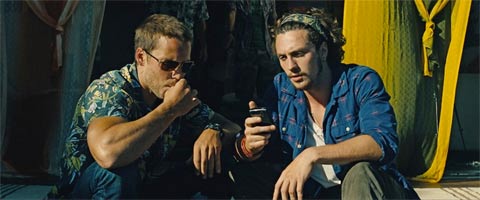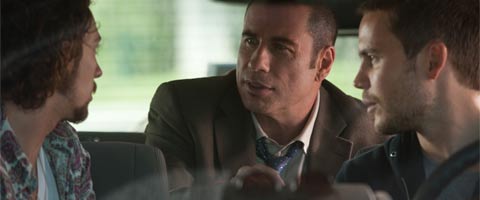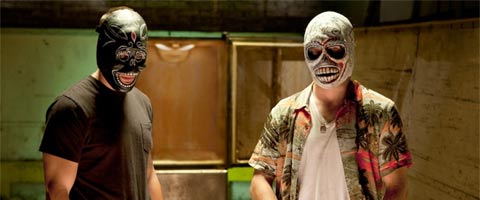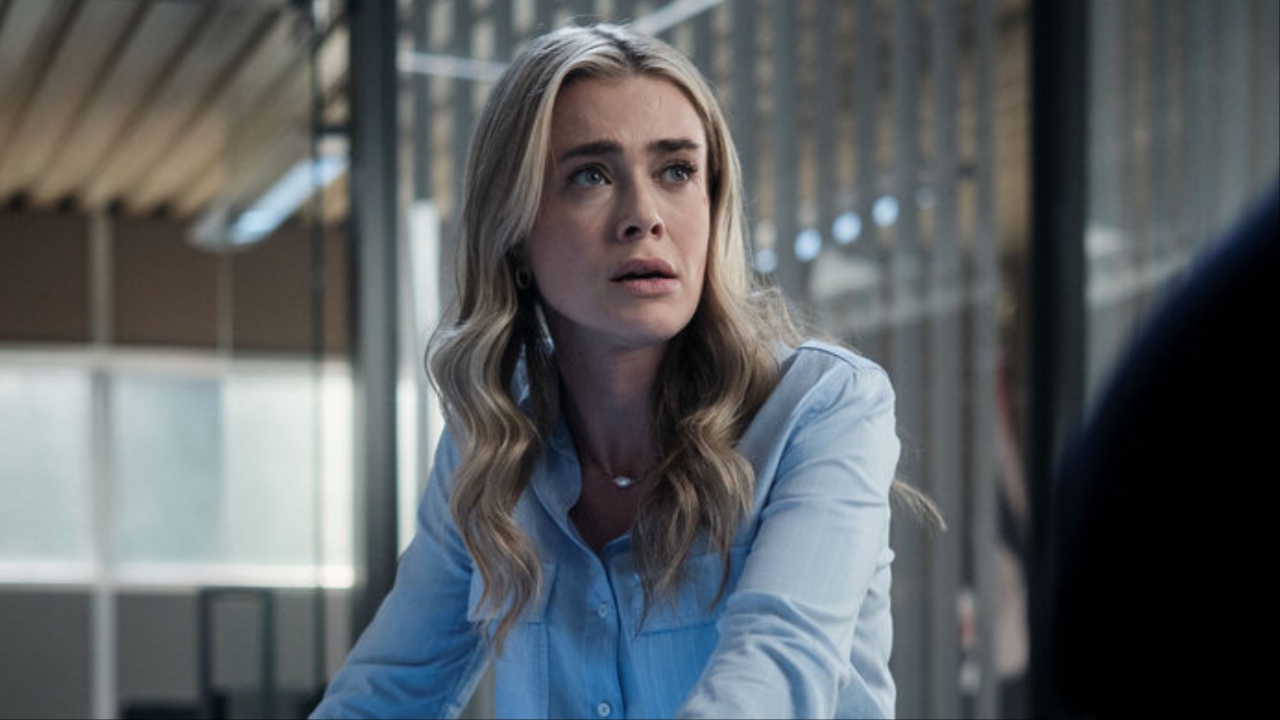Aaron Johnson And Taylor Kitsch Discuss Their Relationship Of Acceptance In Savages

In Oliver Stone’s Savages, the characters played by Aaron Johnson couldn’t be more different. While they are connected through their shared girlfriend O (Blake Lively), and run a successful business together growing weed, everything else about their personalities completely clashes. One is a Buddhist trying to live a life of peace and understanding, while the other is a former marine whose mind is still at war and who lives for pain. So how do the two characters connect? It was something I was curious about when I recently attended a press conference for the new film in Los Angeles.
Below you will find a transcript for the press conference, and in addition to my question about Ben and Chon’s relationship, you can read the actors' responses to other journalist questions about how the two reacted when they discovered they would be working on an Stone film, their preparation for the more sensual scenes and whether or not a relationship between three people could ever work.
Your characters are best friends and share a girlfriend. How did you come to understand these two guys and do you think that’s really possible to share a girlfriend without any jealousy like that?
Aaron Johnson: No, I don’t think it is [laughs]. Yeah, I think that says a lot about these guys that there’s no shame in their relationship, no jealousy, and it’s a bond that’s stronger than that. It’s sort of a three-way friendship that is based on a lot of loyalty and trust.
Taylor Kitsch: I agree. I think it’s more of the trust thing. For us, I think it was more of a brotherhood. It really does come down to the trust and that was such an integral part of the movie because we have barely any scenes with her so we had to get it basically in one scene. In one scene we had to show this connection between three people that would literally die for each other. So there was more at stake than just showing that we can do it and make it work.
Johnson: I think we’re really a yin and yang because Chon’s this ex-Marine, a kind of fighter, and my character’s a more sensitive, hippie kind of guy. So we were that balance that she looks for. I think she’s just fucking greedy, to be honest [laughs].
How did you prepare for the more sensual scenes with Blake? Did you have to have safe words?
Your Daily Blend of Entertainment News
Kitsch: A lot of sexual improv was going on there [laughs]. You block it out. With Oliver, we had two weeks rehearsal, so we talked until we were about to pass out. Then on the day, I mean, I knew Blake I think three days, four days, before we shot. That was the first week of shooting. So it was just trusting Blake and Oliver like you do on any set. I was just glad it was over with, to be honest. It’s very awkward to do. It’s such a big part of Chon, who he is, and that’s how you meet him. So it’s a pretty intense reveal, no pun intended. It’s all part of it and I was glad it was in the first week.
Both of you have great scenes with great actors like John Travolta and Benicio del Toro, how did you prepare for that, lots of prep like with Blake?
Kitsch: I think that’s just what they are as well. And why they are who they are is just because they’ve come on as an actor. Obviously, it’s John Travolta and Benicio and you just respect those guys. They’re icons for a good reason.
Johnson: There was a lot of room to play around as well. I think you get that opportunity with those guys. They’re just free to kind of experiment and they’re not afraid to. And Oliver’s not afraid to allow that kind of creativity to happen. So you get more out of it and we get more out of it. I think that was great. And also, we’d never really know. So coming up to those scenes, it was still sort of figuring out, “How strong do we come in on that?” Oliver was, “Does he come in and stab him in the hand?” He would play with it so we’d talk about it a lot. I think that’s what Oliver is like. He needs to get the sensitivity right and the balance right so it doesn’t become overwhelming or too surreal. There was a reality barrier that we always were trying to juggle and I think that comes across really well in the film, that you never doubt anything. The situation that they’re in, you don’t ever find it unbelievable.
Kitsch: I think it takes a special actor as well, which they are, just to give you that scene in that way. I’ve worked with obviously lesser actors and what-not that are more worried about how they’re going to come out of the scene than the scene itself. So I think it just says so much about Benicio and John that they’re just like, “Yeah, let’s make this scene incredibly memorable and let it just serve the script and not selfishly our characters, ourselves.”

I wanted to know, when you got that call from Oliver Stone, what was your reaction? And Aaron, playing this Orange County surfer guy, being from England, how did you research that kind of role and come up with the look?
Kitsch: I just told Oliver how lucky he was [laughs]. It’s just an amazing accomplishment and I hold a lot of pride within that to be working with these guys – John and Oliver. It’s something that you’ll have for a long time. It was amazing.
Johnson: It was great for me to kind of embrace the South Cali. We did a lot of preparation on this. We had to learn a lot about the marijuana business and go in the grow-ops and see the most fantastic plants. It was a slow build, but Oliver wanted to give it a lot of subtext and he loves to go deep into the background -- my guy studied at Berkeley and this whole science behind the medicinal marijuana. It was all of that so it was so much to kind of grasp. We had meetings with DEA agents, and the situations on the kidnappings and cartel. It was really quite intense and some really dark stuff that we had to take onboard. You open your arms to that and grasp as much knowledge as possible and use it in your preparation and kind of throw it away when you’re on the job. It was good.
During Oliver Stone films, the devil’s in the details, was there a lot of paying attention to that?
Kitsch: I think you’re always conscious of that. That’s where the prep, rehearsal [comes in]. I shadowed a Navy SEAL for a long time and working with those guys, I felt quite set, even in rehearsals. So I practiced an enormous amount and so does Johnson. The rehearsals were quite intense, so you were quite set. You felt quite good on the day because you had it out. So many of our questions were done and dealt with in rehearsal and then you go and play. He’ll call you out when necessary and you collaborate like anything else. I just loved that he holds you accountable and I just think that gets the best out of you.

Considering the bond your characters have with Blake, what do you think of Salma’s line that if they really loved her they would have fought each other over her, not allowing each other to share her?
Kitsch: I think it’s almost un-debatable that you can tell how much we love O. I think it’s more of playing the higher card rather than making it about us, of who loves her more, rather than both of us dying for her more or less, or doing whatever it takes. I think our actions will speak a lot louder than us debating who loves her more.
Johnson: I think she carries that spirit in her that is my guys are coming after me. I think it’s just a part of the game Salma has with her.
When you tackle a project like this based on a book, how much is that an influence or do you just focus on the script?
Kitsch: Chon says maybe two lines in the book [laughs], so… And I definitely thought about it. I love Chon in the book, I think everyone does. I wish we had a couple of those scenes selfishly where he goes into the sailboat in the book and does that thing. I think it’d be incredibly boring to watch me not say a word and not really do much and then shoot the odd gun. One of my favorite scenes is in the car after we switch cars and they take the money, that’s just verbally where we’re both at, and I just love that scene. That’s really who Chon is to me.
Johnson: I think in the film it plays a lot more into our dynamic. It puts our relationship on the line because of the circumstances that we’re in. I think in the book, there was a longer journey to where they were getting to. But I think Oliver found the right pace for this movie and I think sometimes there has to be a big decision to make a cut at some point to tell the story. I think that’s what a good director is, someone who can tell a story. In a book, you want a book to carry on going. There were some great scenes in there that we kind of just tried to push into one. We’ve got a couple heists in there that do just the same thing. I think everything has an answer for what we’re doing so that you don’t ever doubt it. I think with the book, there’s that point where they’ve done one too many heists and you think, “Why hasn’t the cartel got a clue on what’s going on here?” And I think it pushes the boundary a bit too far that I think in the film world, you wouldn’t want to start questioning that.
In the movie, your characters Ben and Chon are really kind of polar opposites, but they are connected through O and their business. It’s mentioned that you were friends in high school, but how do you think your characters became friends?
Kitsch: I think for me it’s because of acceptance. I don’t think it made it in, but Chon’s father beat the crap out of him a lot and they had some of that in there. I think with O and especially Ben’s character, for Chon, it’s more of this guy accepts him for who he is. I think with any relationship that’s everything and that’s the one person that Chon will do anything for. To protect Ben and O, for that matter, is Chon’s purpose. His purpose is lost with being out of the war so he’s given him purpose. For me, that was everything. That’s why he would do what he did, to protect him.

Taylor, earlier this year, you did some big science fiction films, was this a chance to dig into some meatier material?
Kitsch: Yeah, it was exciting. I kept pitching Aliens to Oliver, but he wasn’t buying it [laughs]. No, it’s back to being just mano y mano, working with actors and not green screen. It was very refreshing. Both of those films taught me an immense amount of patience and I think I really brought that over to Savages. Man, I tell you, I really love being on these sets with these actors and being a part of it, not that I didn’t with the others. But just to make it as raw as this film is, to get back to what it is, just going off another actor and really searching, creating and collaborating that way is refreshing and I’ll stay on that track. No green screen for a while.
What is your take on legalization and how that would affect violence such as in this film?
Johnson: I think it’s kind of a heavy, loaded question. It’s kind of strange because I’m British so for me to talk about the situation in Mexico and the political sense of it in the States is kind of weird to us, to me.
Kitsch: I’m Canadian. We’re not violent [laughs]. It’s not a yes or no, black or white answer. You’re not going to all the sudden take the violence out of what’s going on and that’s fact. It’s not just marijuana they’re fighting over as well. To regulate it and to sanction it, that would take years to actually do it right in my opinion, from what I learned on this film which isn’t a ton for me to have a professional opinion on what should happen. But I think if done right, it could work or it could aid in the process. I just don’t think it’s that simple. I mean, I think there’s seven cartels right now. Just legalizing that, it’s not the answer, but it may facilitate it.

Eric Eisenberg is the Assistant Managing Editor at CinemaBlend. After graduating Boston University and earning a bachelor’s degree in journalism, he took a part-time job as a staff writer for CinemaBlend, and after six months was offered the opportunity to move to Los Angeles and take on a newly created West Coast Editor position. Over a decade later, he's continuing to advance his interests and expertise. In addition to conducting filmmaker interviews and contributing to the news and feature content of the site, Eric also oversees the Movie Reviews section, writes the the weekend box office report (published Sundays), and is the site's resident Stephen King expert. He has two King-related columns.
